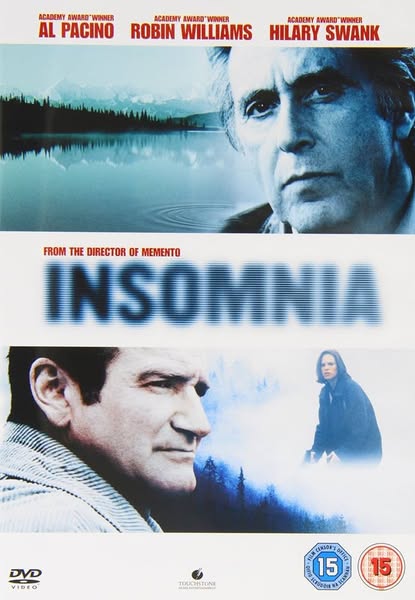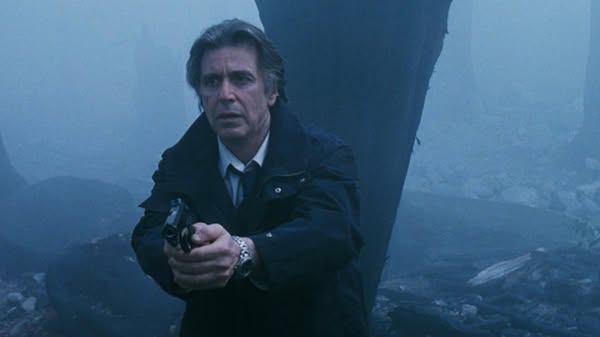Insomnia (2002)

Insomnia (2002) is a psychological thriller directed by Christopher Nolan that masterfully delves into themes of guilt, morality, and the blurred lines between right and wrong. A remake of the 1997 Norwegian film of the same name, this version features a stellar cast, including Al Pacino, Robin Williams, and Hilary Swank. Set in the hauntingly beautiful but disorienting landscape of Alaska, the film explores the mental deterioration of a detective investigating a murder case while grappling with his own demons.
The story follows Will Dormer (Pacino), a seasoned LAPD detective sent to a remote Alaskan town to investigate the murder of a teenage girl. As he arrives in the perpetual daylight of the region, the unique setting serves as a metaphor for Dormer’s growing psychological strain. The film skillfully captures the disorienting effects of insomnia, as Dormer finds himself unable to escape the relentless light, which mirrors his internal turmoil and deteriorating mental state.

As the investigation unfolds, Dormer becomes embroiled in a cat-and-mouse game with the prime suspect, Walter Finch (Williams), a local writer who possesses an unsettling calmness and intelligence. Williams delivers a chilling performance that contrasts sharply with Pacino’s portrayal of the weary and guilt-ridden detective. The dynamic between the two characters is central to the film, as Finch manipulates Dormer’s vulnerabilities, exposing the moral ambiguities of their respective actions.
Nolan’s direction is meticulous, creating a palpable sense of tension and unease throughout the film. The cinematography by Wally Pfister enhances the dreamlike quality of the Alaskan landscape, capturing both its beauty and its foreboding nature. The use of light and shadow plays a crucial role in visual storytelling, reflecting Dormer’s internal struggle and the themes of deception and clarity.

The screenplay is tight and engaging, weaving together elements of mystery and psychological drama. As Dormer’s insomnia intensifies, so does his guilt over a past incident involving his partner, which adds layers to his character and motivates his actions throughout the film. The exploration of guilt and moral compromise serves as a powerful commentary on the psychological toll of law enforcement work, questioning the ethical boundaries that individuals are willing to cross.
The score, composed by David Julyan, complements the film’s tense atmosphere, heightening the sense of urgency and dread. The music underscores Dormer’s psychological unraveling, enhancing the emotional weight of key scenes and drawing viewers deeper into his troubled mind.

Insomnia culminates in a gripping climax that forces Dormer to confront his own failings and the consequences of his choices. The resolution is both poignant and thought-provoking, leaving audiences to reflect on the nature of truth, justice, and the human condition.
In conclusion, Insomnia is a compelling psychological thriller that stands out in Christopher Nolan’s filmography. With its rich character development, atmospheric setting, and moral complexity, the film invites viewers to explore the darker aspects of the human psyche. Al Pacino’s haunting performance, combined with Robin Williams’ chilling portrayal, creates a captivating narrative that lingers long after the credits roll. Insomnia ultimately serves as a thought-provoking exploration of guilt, morality, and the relentless pursuit of truth in a world where the lines between right and wrong are often indistinct.











